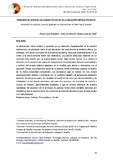| dc.rights.license | http://creativecommons.org/licenses/by-nc-sa/3.0/ve/ | es_VE |
| dc.contributor.author | Sanz Rubiales, Álvaro | |
| dc.contributor.author | Barón, Francisco | |
| dc.contributor.author | Del Valle Rivero, María Luisa | |
| dc.date.accessioned | 2024-07-23T14:37:37Z | |
| dc.date.available | 2024-07-23T14:37:37Z | |
| dc.date.issued | 2024-07-23 | |
| dc.identifier.issn | 2244-7482 | es |
| dc.identifier.uri | http://www.saber.ula.ve/handle/123456789/50843 | |
| dc.description.abstract | La interacción entre médico y paciente es un elemento fundamental en la relación asistencial y se entiende como el eje alrededor del cual gira de la bioética clínica. Sin embargo, uno de los principios de la bioética, la justicia, hace que esta interacción no se limite a la mera relación entre dos individuos. La justicia sitúa esta relación en un contexto más amplio que se podría llamar social. Algo similar sucede si se analiza la relación con el paciente por parte de cualquiera de los integrantes del personal sanitario o incluso del propio sistema sanitario en la medida que afecta o interactúa con el paciente. Desde la perspectiva social de la justicia, estas relaciones superan el ámbito de la mera privacidad compartida. Las decisiones que se toman en ese núcleo aparentemente aislado o protegido por la confidencialidad y la autonomía dependen también, al menos en parte, de variables de perfil social como son las necesidades y los estándares de los demás pacientes, así como los recursos -de personal, de medios o incluso de tiempo-, generalmente limitados, y que es preciso distribuir de manera equitativa. De acuerdo con el principio de justicia, todos estas variables externas son elementos que es preciso tener en cuenta en la toma de decisiones que se lleva a cabo con cada paciente. | es_VE |
| dc.language.iso | es | es_VE |
| dc.rights | info:eu-repo/semantics/openAccess | es_VE |
| dc.subject | Justicia | es_VE |
| dc.subject | Principialismo | es_VE |
| dc.subject | Social | es_VE |
| dc.title | Principio de justicia: un elemento social en la relación médico-paciente | es_VE |
| dc.title.alternative | Principle of justice: a social element in the doctor-patient relationship | es_VE |
| dc.type | info:eu-repo/semantics/article | es_VE |
| dc.description.abstract1 | The interaction between doctor and patient is a fundamental element in the healthcare relationship and is understood as the axis around which clinical bioethics revolves. However, one of the principles of bioethics, justice, means that this relationship is not limited to the mere relationship between two individuals. Justice as a principle places this relationship between doctor and patient in a broader context that could be called social. And the same happens if we analyze the relationship with the patient by any of the members of the healthcare staff or even the healthcare system itself as it affects or interacts with the patient. From the social perspective of justice, these relationships go beyond the realm of mere privacy, albeit a shared privacy. The decisions that are made in this apparently isolated nucleus, protected by confidentiality and autonomy, also depend, at least in part, on variables of social profile such as the needs and standards of other patients as well as the resources - of personnel, means or even time – that are usually limited and that must be distributed equitably. All these external variables are elements that must be taken into account, in accordance with the principle of justice, in the decision-making that must be carried out in each patient. | es_VE |
| dc.description.colacion | 51-63 | es_VE |
| dc.description.email | asrubiales@hotmail.com | es_VE |
| dc.description.frecuencia | Semestral | es |
| dc.description.paginaweb | http://www.saber.ula.ve/revistabioetica/ | es |
| dc.publisher.pais | Venezuela | es_VE |
| dc.subject.institucion | Universidad de Los Andes | es_VE |
| dc.subject.keywords | Justice | es_VE |
| dc.subject.keywords | Principialism | es_VE |
| dc.subject.keywords | Social | es_VE |
| dc.subject.seccion | Revista de Bioética Latinoamericana: Artículos | es_VE |
| dc.subject.tipo | Revistas | es_VE |
| dc.type.media | Texto | es_VE |


